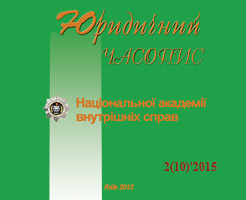The National Legislation of Ukraine in the Sphere of Combating Crimes Against Morality
Keywords:
crimes against morality, national legislation, morality, values
Abstract
One of the conditions of state formation and normal development of the country is the protection of public morality and values of every person exposed to constant diverse influence, including, the devastating one. Law enforcement and government authorities carry out activities to protect public morality and values of every person, and this work is reflected in the relevant laws and regulatory legal acts that change and adapt to current circumstances. Understanding by the counteraction subjects of the peculiarities of legal support determines the effectiveness of their work in protection of public morality and values, confirming the importance of monitoring legislative support to combat unlawful acts that infringe morality. In Ukraine, government and law enforcement agencies, and nongovernmental organizations are working to protect morality of citizens exercised in compliance with applicable laws, including specially adopted legal acts. A separate law on protection of morality does not exist, but the legal basis of combating crimes against morality icludes the Constitution of Ukraine, some of the laws and other legal acts. Into this list, first of all, should be included the Criminal Code of Ukraine, Laws of Ukraine «On Protection of Public Morality» and «On Combating of Human Trafficking». The Law of Ukraine «On Protection of Public Morality» stipulates that violation of the norms of legislation of Ukraine on protection of public morality, the conditions of circulation of goods, entertainment of sexual nature and distribution of products that contain elements of pornography entails responsibility, including criminal. However, the Criminal Code of Ukraine does not define a particular crime or crimes against public morality, instead its Chapter XII of Special Section provides for crimes against public order and morality. To harmonize the Law of Ukraine «On Protection of Public Morality» with the Criminal Code of Ukraine in this part, the author offers to make reasonable amendments to the mentioned legal norm. The results of the study can be used in the improvement of national legislation of Ukraine on combating crimes against morality, to raise awareness of legal support peculiarities of the fight against these crimes by stakeholders, and also at conducting further research in this sphere.Downloads
Download data is not yet available.
Abstract views: 158 PDF Downloads: 136
How to Cite
[1]
Yemets, O. 1. The National Legislation of Ukraine in the Sphere of Combating Crimes Against Morality. Law Magazine of the National Academy of Internal Affairs. 10, 2 (1), 62-70.
Issue
Section
Combating crimes: theory and practice
Copyright (c) 2017 Law Magazine of the National Academy of Internal Affairs

This work is licensed under a Creative Commons Attribution-NonCommercial-NoDerivatives 4.0 International License.
- Authors reserve the right to authorship of their own work and transfer to the magazine the right of the first publication of this work under the terms of the Creative Commons Attribution License, which allows other persons to freely distribute published work with mandatory reference to authors of the original work and the first publication of an article in this magazine.
- Authors have the right to enter into separate additional agreements on non-exclusive dissemination of the work in the form in which it was published in the journal (for example, to post an article in the institution's repository or to publish as part of a monograph), provided that the link to the first publication of the work in this journal is maintained.
- The journal's policy allows and encourages the posting of articles by authors on the Internet (for example, in electronic storehouses of institutions or on personal websites), both before the submission of this manuscript to the editorial office and during its editorial processing, as this contributes to the creation of a productive scientific discussion and positively affects the efficiency and dynamics of citing the published work.




